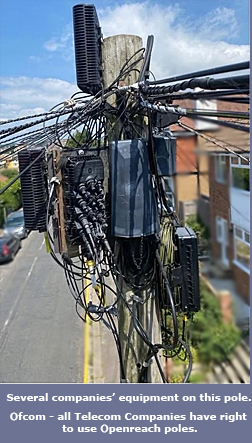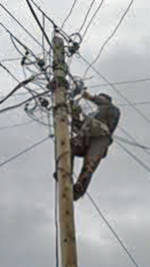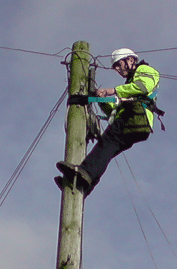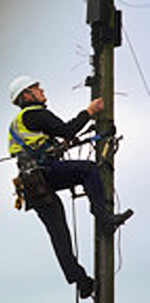The Safety Of Telecoms Companies' Equipment Placed In Exchanges And On Poles Under Scrutiny
Network operator Openreach have surprised several communications providers in September, and perhaps CWU members working in exchanges, who via their safety reps; have raised concerns about the type of plant being installed by other than Openreach, with sometimes dubious safety and maintenance practices.
 Openreach gave these companies just 48 hours to remove any lithium batteries from BT exchanges. The batteries directive stems from the operator’s building safety policy, which bans these batteries due to the significant risks of thermal runaway, fire, and explosion.
Openreach gave these companies just 48 hours to remove any lithium batteries from BT exchanges. The batteries directive stems from the operator’s building safety policy, which bans these batteries due to the significant risks of thermal runaway, fire, and explosion.
This also concerns BT engineers across the country and their Union Safety Reps, and is similar to the safety concerns reported over the type of equipment being added to Openreach plant. Even some 'D' poles (telegraph poles considered to be dangerous to climb and need replacing), are having additional and sometimes bulky equipment intsalled on top of them by telecoms operators given access to Openreach network equipment in all public places.
Whether or not the safety issues were properly considered by the company and by Ofcom in allowing all companies to access these poles and to what extent the CWU were involved in decisions, is another question.
 This lithium batteries move is noteworthy because Openreach’s rules have not previously specified restrictions on particular battery chemistries, typically using general terms when referring to batteries. Some providers informed ISPreview that they were unclear where exactly in Openreach’s documentation this prohibition is stated.
This lithium batteries move is noteworthy because Openreach’s rules have not previously specified restrictions on particular battery chemistries, typically using general terms when referring to batteries. Some providers informed ISPreview that they were unclear where exactly in Openreach’s documentation this prohibition is stated.
The internal briefing, not publicly accessible, appears to target lithium batteries used in Co-location or Access Locate customer cabinets at BT exchanges. It states that Openreach mandates lead acid batteries as the preferred and safest backup power option for these cabinets.
The briefing does not differentiate between lithium polymer (LiPo) and lithium iron phosphate (LiFePO4) batteries. LiFePO4 batteries, commonly used in industrial and home energy storage, have a safety profile comparable to or better than sealed lead acid batteries, as their chemistry is less prone to overheating and thermal runaway. Moreover, lead-acid batteries contain hazardous materials like lead and sulfuric acid, whereas LiFePO4 batteries are made from more environmentally friendly, recyclable materials. Therefore, the broad ban on “lithium” batteries feels unusual and might have been better framed with more specific safety criteria.
Regardless, Openreach is clearly concerned about safety after identifying lithium batteries in some BT exchanges and has required affected providers to remove them within 48 hours—a period many may find too short.

 Openreach stated this instruction is issued under the Revised Agreement for Access Network Facilities Services (RANF Agreement) and Access Locate contract, with relevant documentation to be updated accordingly. Providers must also inform Openreach about any use of such batteries.
Openreach stated this instruction is issued under the Revised Agreement for Access Network Facilities Services (RANF Agreement) and Access Locate contract, with relevant documentation to be updated accordingly. Providers must also inform Openreach about any use of such batteries.
The safety of Openreach engineers is always of concern to CWU URSs around the country - especially when single engineers are directed to jobs which require two-perons attendance for health & safety reasons, and to align with procedures. Pressures are being put on engineers to speed-up jobs, forego some safety proceduress; resulting in injuries for which the person is blamed and penalised!
Overloaded Telegraph poles are becoming the norm as Ofcom has decided that any telecoms company can attach their own equipment on Openreach/BT poles.
 Further concerns have been raised with regard to the increasing physical attacks on Openreach engineers, with criticism of CWU national officials who are seen as having no understanding of health & safety needs and legislation; being too slow to react and make representations to the company.
Further concerns have been raised with regard to the increasing physical attacks on Openreach engineers, with criticism of CWU national officials who are seen as having no understanding of health & safety needs and legislation; being too slow to react and make representations to the company.
This despite recent media comments from Openreach, recognising the statistics and expressing concerns. There seems to be a major disconnect between the Union, BT line management and reality when it comes to physical risks to engineers.
Dangerous Dog attacks are also a safety factor for engineers, with seldom a word coming from the CWU's constituency executive, and certainly no advise or support, unlike that of the Postal constituency which has negotiated many agreements with their employers, includig official briefings, procedureal advice, and even legal support.
These are all issues that CWU's Union Safety Reps are having to deal with, and are expressing major concerns over.
Source: Openreach / ISP website / unionsafety

